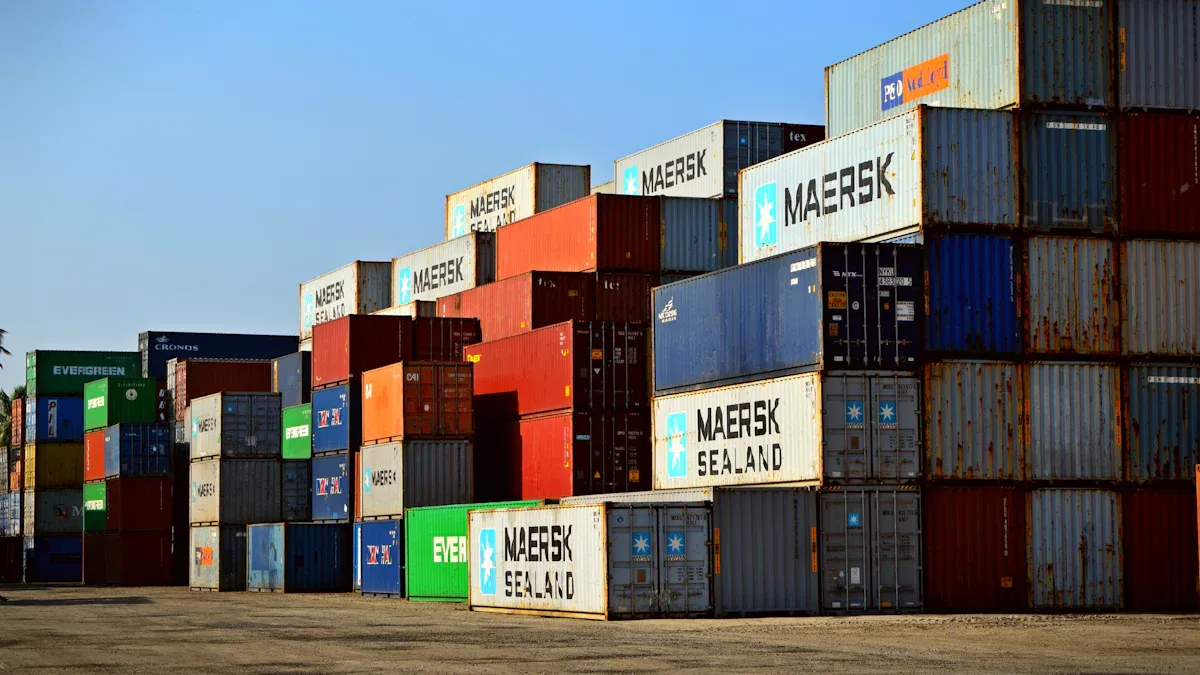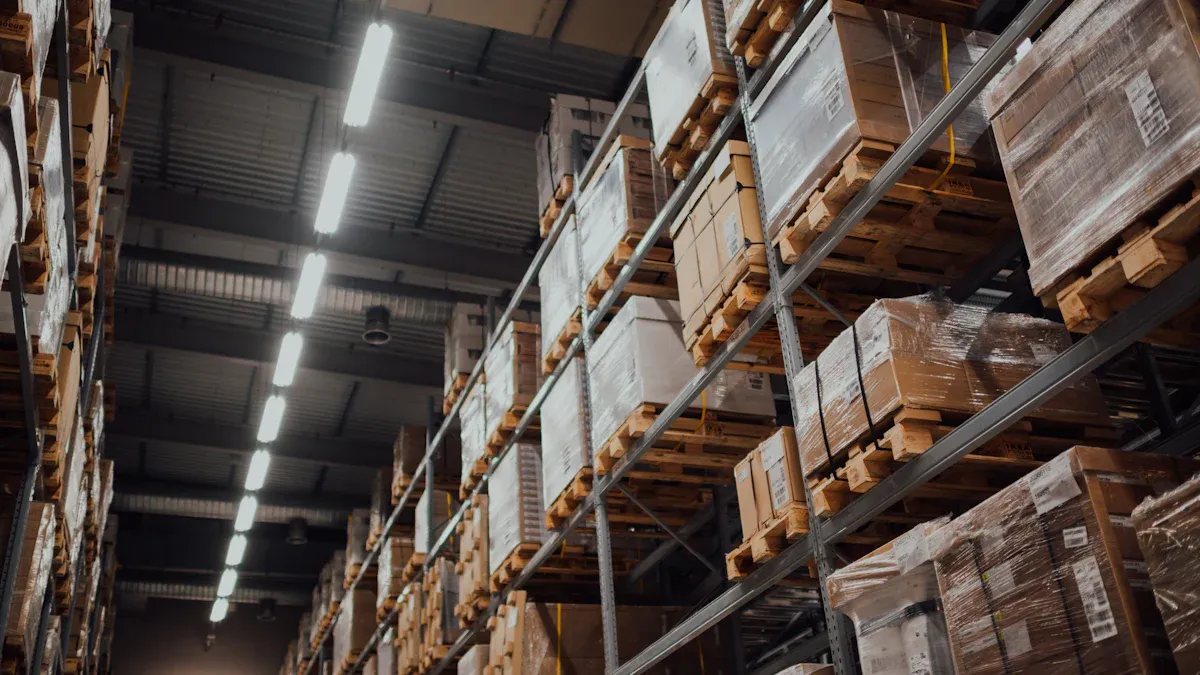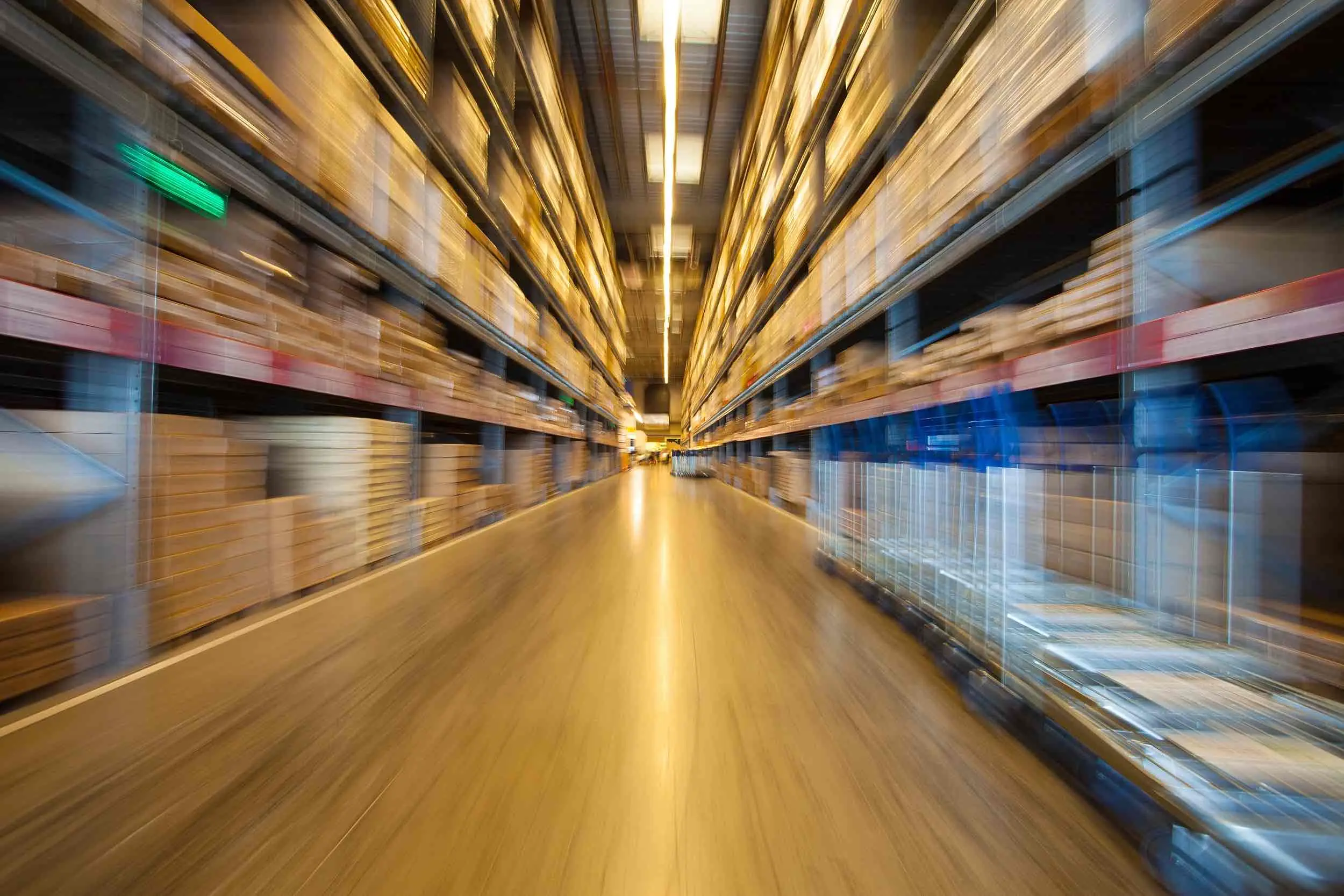Emerging trends in overseas warehousing and logistics for 2025

The logistics industry is experiencing rapid growth, with projected revenue reaching USD 5,951.0 billion by 2030 and a 7.2% annual growth rate. Key trends like digital transformation and sustainability are reshaping operations. The rise of the Overseas Warehouse model highlights the need for connected inventory and global fulfillment solutions to meet evolving consumer demands.
Key Takeaways
Use robots and machines to make warehouse work easier. They cut costs, save time, and make things more accurate.
Use smart tech like AI and IoT to plan better. These tools help track stock, guess needs, and keep customers happy.
Spend on green ideas like solar power and electric trucks. These help the planet and save money over time.
Technological Advancements in Overseas Warehousing

Automation and Robotics in Warehousing
Automation is transforming overseas warehouse operations by enhancing efficiency and reducing costs. Automated systems eliminate manual intervention, allowing tasks to be completed faster and with greater accuracy. For example:
Robotic pickers and automated guided vehicles streamline goods movement, minimizing human errors.
Advanced robotics optimize product placement and accelerate order fulfillment, leading to significant cost savings.
Automation also ensures real-time data usage, keeping inventory records accurate and preventing production delays caused by material shortages. By optimizing inventory levels, you can lower storage costs and avoid the expenses of rush orders. These advancements make automation a cornerstone of modern warehousing trends.
AI and IoT for Real-Time Logistics Optimization
AI and IoT are revolutionizing logistics by enabling smarter, more efficient operations. Predictive AI models help you forecast demand and manage inventory, reducing excess stock by up to 30%. IoT sensors provide real-time shipment tracking, ensuring transparency and enhancing customer satisfaction. Other applications include:
Route optimization for faster deliveries.
Smart freight management with real-time vehicle monitoring.
AI-powered control towers that integrate data for real-time decision-making.
These technologies address labor shortages and improve supply chain resilience, making them essential for overseas warehouse operations.
Digital Twins for Enhanced Supply Chain Management
Digital twins offer a virtual representation of your supply chain, enabling you to simulate and optimize operations. They improve demand forecasting by analyzing sales history and market trends. You can also simulate disruptions, such as supplier delays, to proactively mitigate risks. Digital twins optimize inventory management by mapping inventory flows and supporting just-in-time delivery strategies. Additionally, they enhance transportation efficiency by analyzing shipment volumes and traffic patterns. These capabilities strengthen supply chain resilience and ensure seamless logistics operations.
JUSDA's JusLink: Revolutionizing Warehouse Operations
JUSDA's JusLink platform integrates IoT, cloud computing, and big data to transform overseas warehouse management. It provides real-time inventory systems, enabling you to track stock levels and streamline logistics processes. JusLink enhances supply chain resilience by offering end-to-end visibility and dynamic risk management. Its advanced features, such as real-time data sharing and predictive analytics, empower you to make informed decisions and optimize operations. With JusLink, JUSDA sets a benchmark for technological advancements in warehousing.
Sustainability and Green Logistics Trends for 2025

Renewable Energy-Powered Warehouses
Warehouses powered by renewable energy are becoming a cornerstone of sustainable logistics. Solar panels, wind turbines, and geothermal systems are helping companies reduce their carbon footprint. These energy sources not only lower greenhouse gas emissions but also cut operational costs over time. For example, solar-powered warehouses can generate electricity during the day, reducing dependency on non-renewable energy. By adopting renewable energy, you can align your operations with environmental sustainability goals and meet new regulations like the EU Green Deal.
Logistics companies are also leveraging technology to reduce their carbon footprint through solutions like route optimization software and alternative fuels.
Electric Vehicle Fleets for Last-Mile Deliveries
Electric vehicle (EV) fleets are transforming last-mile delivery by making it more environmentally friendly. EVs significantly reduce CO2 emissions and enhance operational efficiency. They also offer long-term savings through lower maintenance and charging costs compared to traditional fuel. Transitioning to EV fleets requires strategic planning, but the benefits are undeniable. You can improve data management, optimize charging infrastructure, and achieve a lower total cost of ownership. These advancements make EVs a vital part of sustainable logistics.
Circular Economy in Logistics Operations
The circular economy promotes sustainability by emphasizing resource efficiency and waste reduction. It requires you to adapt your logistics processes to new business models and collaborate with stakeholders. Circular strategies can reduce greenhouse gas emissions by 39% and decrease the material footprint by 28% by 2032. By adopting these practices, you can unlock additional value, such as reducing costs and improving operational efficiency. This approach ensures that your logistics operations remain both sustainable and profitable.
JUSDA's Green Warehousing Solutions
JUSDA leads the way in sustainable logistics with its green warehousing solutions. The company integrates renewable energy systems and advanced technologies to optimize warehouse operations. JUSDA's facilities use energy-efficient designs and real-time inventory tracking to minimize waste. By adopting these sustainability initiatives, you can enhance your supply chain's environmental performance. JUSDA's commitment to green logistics sets a benchmark for the industry, helping businesses achieve their sustainability goals.
Supply Chain Resilience and Risk Management
Diversification of Global Supply Chains
Diversifying your global supply chains is essential for mitigating risks and ensuring business continuity. Start by mapping your supply chain to identify vulnerable entities. Expanding your supplier network reduces reliance on a single source, minimizing disruptions. For example, Apple diversified its supply chain by moving production to India and Vietnam, reducing the impact of regional disruptions. Establishing logistics contingency plans, such as backup suppliers and flexible transport routes, further strengthens your supply chain. These strategies create secure and resilient supply chains, enabling you to adapt to unforeseen challenges.
Adapting to Regulatory Changes in 2025
Regulatory changes in 2025 will reshape freight and logistics trends. Post-Brexit border controls will introduce stricter customs requirements, impacting trade between the UK and the EU. Additionally, the Smart Tachograph 2 mandate will require advanced monitoring systems in new heavy goods vehicles, enhancing safety and efficiency. Staying informed about these changes helps you adapt your supply chain management practices. By leveraging cloud-based supply chain management tools, you can ensure compliance and maintain seamless operations amidst evolving regulations.
Overcoming Geopolitical and Climate Challenges
Geopolitical and climate challenges will continue to disrupt global supply chains. Extreme weather events like hurricanes and floods damage infrastructure and delay fulfilment. Investing in resilient infrastructure and optimizing transportation routes can mitigate these risks. Geopolitical conflicts, such as trade disputes or armed conflicts, may disrupt trade routes and increase production costs. To navigate these challenges, you should reassess your supply chain strategies and build agile networks capable of adapting to changing conditions.
JUSDA's Integrated Supply Chain Solutions
JUSDA offers integrated supply chain solutions to help you overcome these challenges. Its platform enhances visibility and collaboration across global supply chains. Real-time data monitoring and predictive analytics enable you to anticipate risks and respond proactively. JUSDA’s solutions streamline fulfilment processes, reduce costs, and improve operational efficiency. By partnering with JUSDA, you can build a resilient and adaptive supply chain that thrives in a dynamic global environment.
Evolving Consumer Expectations and E-Commerce Warehousing Trends
Micro-Fulfillment Centers for Urban Areas
Micro-fulfillment centers are reshaping the expanding e-commerce sector by addressing the demand for faster deliveries. These facilities are strategically located in urban areas, allowing you to fulfill orders quickly and efficiently. Equipped with automated systems, they speed up picking, packing, and shipping processes. This proximity to customers reduces delivery times and transportation costs. You can also lower carbon emissions, making your operations more sustainable. By adopting micro-fulfillment centers, you meet consumer expectations for same-day or next-day delivery while enhancing customer satisfaction.
Reverse Logistics and Returns Management
Managing returns effectively is critical in e-commerce. A well-executed reverse logistics process helps you retain customers and optimize inventory. Treating returned goods as valuable assets maximizes their potential. Automating the returns process reduces errors and improves efficiency. Real-time visibility into the returns pipeline allows you to identify bottlenecks and resolve them quickly. Collecting customer feedback on returns helps you improve the process and boost satisfaction. By implementing these practices, you enhance your brand's reputation and streamline operations.
Urban Warehousing for Faster Deliveries
Urban warehousing plays a vital role in meeting the growing demand for faster deliveries. Locating warehouses near customers minimizes transportation time and costs. This proximity enables you to offer same-day or next-day delivery, which is now a standard expectation in e-commerce. Urban warehouses also facilitate real-time inventory tracking, ensuring stock availability to meet demand. Storing goods closer to customers reduces fuel consumption and vehicle maintenance costs. These benefits make urban warehousing essential for achieving global fulfillment goals.
JUSDA's Overseas Warehouse Network for E-Commerce
JUSDA's extensive overseas warehouse network supports your e-commerce operations by providing efficient and reliable solutions. With facilities in key regions like China, the United States, and Europe, JUSDA ensures seamless global fulfillment. Its advanced inventory management systems, such as JusLink, offer real-time tracking and control. These capabilities help you optimize inventory turnover and reduce stockouts. JUSDA's commitment to innovation and efficiency positions it as a trusted partner in the e-commerce warehousing landscape.
Future-Proofing Strategies for Freight and Logistics Trends
Leveraging Data Analytics for Decision-Making
Data analytics is transforming logistics trends for 2025 by enabling smarter decision-making. You can use analytics to identify inefficiencies in transportation and warehousing, which helps reduce costs and streamline operations. For example, analyzing historical sales data allows you to forecast demand accurately, ensuring optimal inventory levels. Real-time data exchange among supply chain partners enhances collaboration and responsiveness to market changes. Additionally, route optimization through data analysis minimizes transit times, cutting costs and supporting sustainability goals. By continuously monitoring performance metrics, you can adapt to evolving market dynamics and foster a culture of improvement.
Building Strategic Partnerships with Providers
Strategic partnerships with logistics providers offer numerous benefits that can future-proof your operations. Collaborating with providers increases operational efficiency by sharing resources and reducing costs. Partnerships also open access to new markets, allowing you to reach untapped customer segments and geographic areas. Risk mitigation becomes easier as shared expertise helps manage uncertainties and market fluctuations. Moreover, these collaborations drive innovation by fostering the development of new technology and processes.
Benefit | Description |
|---|---|
Increased operational efficiency | Sharing resources leads to cost savings and better utilization. |
Access to new markets | Partnerships open new customer segments and geographic areas. |
Risk mitigation | Shared risks provide support during market fluctuations. |
Innovation and knowledge sharing | Collaboration fosters new technology and process development through shared expertise. |
Workforce Training for Advanced Logistics Technologies
As technology evolves, training your workforce becomes essential to stay competitive. Employees must learn to operate advanced systems like IoT-enabled devices, machine learning platforms, and cloud-based tools. Training programs should focus on practical applications, such as using predictive analytics for demand forecasting or managing automated systems in warehouses. Upskilling your team ensures they can adapt to new logistics trends for 2025 and maximize the benefits of emerging technologies. A well-trained workforce not only boosts operational efficiency but also enhances your ability to meet customer expectations.
JUSDA's End-to-End Supply Chain Collaboration Platform
JUSDA’s end-to-end supply chain collaboration platform exemplifies how technology can future-proof logistics operations. The platform integrates IoT, cloud computing, and machine learning to provide real-time data exchange and visibility across the supply chain. You can use its predictive analytics to optimize routes, manage inventory, and anticipate disruptions. By streamlining processes and enhancing transparency, JUSDA’s platform helps you adapt to logistics trends for 2025. Its innovative approach ensures your supply chain remains agile, efficient, and customer-focused.

JUSDA Solutions
To provide you with professional solutions and quotations.
The logistics and warehousing industry is evolving rapidly, with several transformative changes expected by 2025:
Space availability will vary, creating challenges in stock commitments.
Automation will dominate, offering efficiency despite higher initial costs.
Maintenance costs will shift due to new technologies.
Companies will balance centralized stock models with forward-deployed strategies.
Connected inventory will enhance visibility and information sharing.
Global fulfillment will cater to multiple markets simultaneously.
Larger warehouses with advanced systems will become the norm.
To remain competitive, you must focus on:
Automation to address global labor shortages and optimize resources.
JUSDA’s innovative solutions and global network empower you to navigate these trends effectively. By embracing these advancements, you can future-proof your operations and thrive in 2025.
See Also
Five Key Trends Shaping Future Supply Chain Efficiency
Understanding Logistics Risk Trends and Their Impacts
Exploring New Developments in Sea Freight Logistics for 2024
Transforming Logistics for Tomorrow with AI Supply Chain
Advantages of Automation in High-Tech Manufacturing Warehouses
